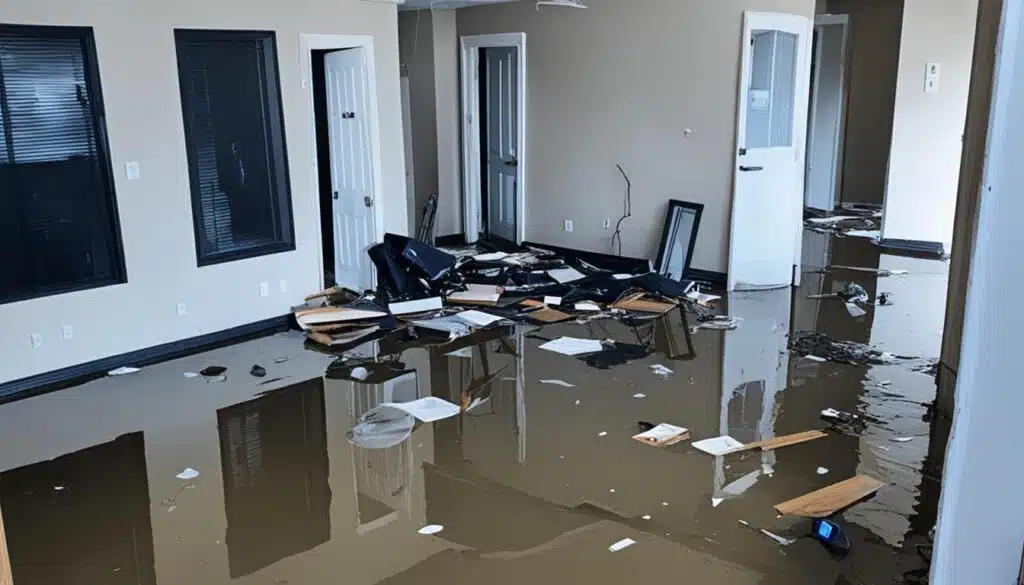Renters insurance is a vital safeguard for tenants, providing coverage for their personal property and offering liability protection. It also extends coverage for additional living expenses in case the rental property becomes uninhabitable due to covered perils. With the average cost of renters insurance being $148 a year, it offers an affordable way to ensure financial security for renters.
A renters insurance policy typically includes coverage for personal belongings such as furniture, electronics, and clothing, in the event of theft, fire, or other named perils. It also provides liability coverage if the tenant is responsible for injuries to others or damage to their property, both on and off the rental property. Additionally, renters insurance includes coverage for additional living expenses, such as hotel stays and meals, when the rental unit is rendered uninhabitable.
Key Takeaways:
- Renters insurance covers personal belongings, liability, and additional living expenses.
- It protects against theft, fire, and named perils.
- Liability coverage extends to injuries or damages caused by the tenant.
- Additional living expenses coverage provides compensation for temporary relocation.
- Renters insurance is an affordable safety net for tenants.
What is Renters Insurance?
Renters insurance, also known as tenants insurance or an HO-4 policy, is designed for individuals who rent or lease their living spaces. It provides financial protection for their personal belongings in case of theft, fire, or other named perils. Unlike homeowners insurance, renters insurance does not cover the structure of the building, as that is the responsibility of the landlord’s insurance policy. Many landlords now require tenants to purchase renters insurance to safeguard their personal belongings.
When you have renters insurance, you can have peace of mind knowing that your personal belongings are protected in case of unexpected events. Whether it’s furniture, electronics, clothing, or other valuable possessions, renters insurance helps cover the cost of replacing these items if they are damaged or stolen.
Why is Renters Insurance Important?
Apart from covering personal belongings, renters insurance also offers liability coverage. This means that if someone gets injured in your rented property or if you accidentally cause damage to someone else’s property, your renters insurance will help cover the costs associated with legal claims or medical expenses.
Renters insurance is often required by landlords as an additional layer of protection for their properties. It ensures that tenants can financially recover in the event of a covered loss, reducing the potential for disputes or financial strain between tenants and landlords.
Renters Insurance vs. Homeowners Insurance
While homeowners insurance protects both the structure of the building and personal belongings, renters insurance primarily focuses on personal property coverage. This is because the landlord’s insurance policy is responsible for covering the structure of the building in which the tenant resides.
It’s important for tenants to understand that the landlord’s insurance policy does not cover the tenant’s personal belongings. This is where renters insurance steps in, providing financial protection and peace of mind for tenants.
What Does Renters Insurance Cover?
Renters insurance provides comprehensive coverage for tenants, safeguarding their financial well-being in various situations. Here are the four types of coverage typically included in renters insurance policies:
- Personal property coverage: This coverage reimburses tenants for the loss or damage of their personal belongings due to specific events such as fire, theft, vandalism, and certain weather-related damage. It extends coverage to items both inside and outside the home, with some limitations on coverage outside the home.
- Loss of use coverage: In the unfortunate event that the rental property becomes uninhabitable, loss of use coverage comes into play. It pays for additional living expenses, such as hotel stays, meals, and other necessary expenses, ensuring tenants can maintain their quality of life during the displacement.
- Liability insurance: Liability insurance covers tenants if they are responsible for injuries to other people or damage to their property, both on and off the rental property. It provides financial protection and peace of mind in case of accidents or unforeseen circumstances.
- Medical payments coverage: Medical payments coverage offers protection against medical expenses if someone is injured in the tenant’s home, regardless of fault. It ensures that necessary medical treatments are covered, reducing potential financial burdens.
With these four types of coverage, renters insurance provides comprehensive protection for tenants, offering financial support in situations that could otherwise result in significant costs and stress.

Optional Renters Insurance Coverage
In addition to the standard coverage, renters insurance policies often offer optional coverage that can be added for an additional cost. These include:
1. Replacement Cost Coverage
Replacement cost coverage pays the full cost of replacing damaged belongings with new ones, rather than just the actual cash value cover theft .
2. Scheduled Personal Property Coverage
Scheduled personal property coverage is designed for items that exceed the standard coverage limits, such as high-value jewelry , electronics , personal items.
3. Water Backup Coverage
Water backup coverage provides protection in case of damage caused by backed-up sewage or drains ,landlord insurance.
4. Pet Damage Liability
Pet damage liability coverage covers damage caused by pets in the rental property.
5. Identity Theft Coverage
Identity theft coverage can help with expenses associated with identity theft, such as credit monitoring and legal fees.
These optional coverages can provide renters with additional peace of mind and protection for specific risks that may not be covered under the standard policy. Adding these coverages to the renters insurance policy can help ensure comprehensive protection based on the individual’s needs and circumstances.
What Renters Insurance Doesn’t Cover
Renters insurance provides valuable protection for tenants, but it’s essential to understand its limitations. There are certain events and situations that are typically not covered by standard renters insurance policies. It’s important for tenants to be aware of these exclusions to ensure they have the necessary coverage to protect their assets and minimize financial risks.
1. Flood Damage
Flood damage is not covered by standard renters insurance. Floods can cause extensive damage to personal property, and tenants living in flood-prone areas should consider obtaining separate flood insurance to safeguard their belongings. This specialized insurance protects against water damage caused by heavy rains, hurricanes, or overflowing bodies of water.
2. Earthquake Damage
Earthquake damage is also typically not covered by standard renters insurance. Earthquakes can cause significant destruction, putting personal property at risk. Tenants residing in earthquake-prone regions should consider purchasing separate earthquake insurance to protect their belongings in the event of an earthquake.
3. Infestations
Renters insurance does not cover infestations caused by pests such as bedbugs or other insects. Infestations can lead to property damage and health risks. It is the tenant’s responsibility to address and resolve infestations, either by hiring professional pest control services or taking appropriate measures to prevent and eliminate infestations.
4. Roommate’s Belongings
Standard renters insurance policies typically do not cover damage to a roommate’s belongings unless they are covered under a shared policy. Each individual living in a rental unit should have their own renters insurance policy to protect their personal property. This ensures that each tenant is responsible for their belongings and eliminates potential conflicts or disputes in case of damage or loss.
“Renters insurance provides valuable protection for tenants, but it’s essential to understand its limitations.”
To ensure adequate coverage, tenants should assess their specific needs and consider additional insurance policies or endorsements to address any potential gaps in coverage.
Table: Comparison of Renters Insurance Coverage
| Loss/Damage | Standard Renters Insurance Coverage | Not Covered |
|---|---|---|
| Flood Damage | No | Requires separate flood insurance |
| Earthquake Damage | No | Requires separate earthquake insurance |
| Infestations | No | Tenant’s responsibility |
| Roommate’s Belongings | No, unless covered under a shared policy | Each tenant should have their own renters insurance |
While renters insurance provides essential coverage for many common perils, it’s crucial for tenants to understand what is and isn’t covered to make informed decisions about additional insurance options. By being aware of these exclusions and taking proactive steps to address them, tenants can better protect their assets and have peace of mind.

How to Get Renters Insurance
To get renters insurance, tenants should follow these steps:
- Assess insurance needs: Determine the value of personal belongings and any additional coverage required.
- Choose an insurance company: Research different insurers and their ratings to find a reputable provider.
- Fine-tune your policy: Select the type of coverage and deductible that best suits your needs and budget.
- Pay for your policy: Complete the application process and pay the required premium.
Assessing insurance needs is the first step in obtaining renters insurance. It’s important to accurately calculate the value of personal belongings to ensure adequate coverage. Consider additional coverage options such as replacement cost coverage or scheduled personal property coverage for high-value items.
Choosing an insurance company is crucial as you want to work with a reliable and responsive provider. Research different insurers, read customer reviews, and check their financial ratings to make an informed decision.
Fine-tuning your policy involves selecting the appropriate coverage and deductible. Consider factors such as the value of your belongings, the potential risks in your area, and your budget when making these decisions.
Paying for your policy is the final step. Complete the application process with the chosen insurance company and make sure to pay the required premium on time to activate your coverage. Keep in mind that the cost of renters insurance is typically affordable, with an average annual premium of $148.

| Steps to Get Renters Insurance | Description |
|---|---|
| Assess insurance needs | Determine the value of personal belongings and any additional coverage required. |
| Choose an insurance company | Research different insurers and their ratings to find a reputable provider. |
| Fine-tune your policy | Select the type of coverage and deductible that best suits your needs and budget. |
| Pay for your policy | Complete the application process and pay the required premium. |
How to File a Renters Insurance Claim
When an unexpected event occurs that leads to damage or loss covered by your renters insurance policy, it’s important to take the proper steps to file a claim and ensure a smooth claims process. By following these steps, you can navigate through the claims process efficiently:
1. Report the Situation
As soon as the incident happens, report the situation to your landlord or property management. If it involves theft, vandalism, or any criminal activity, it is important to file a police report. This documentation will be necessary when filing your renters insurance claim.
2. Assess Safety and Secure the Property
After reporting the incident, assess the safety of your property. Take any necessary steps to secure your belongings or make temporary repairs to prevent further damage.

3. Contact the Insurance Company
Reach out to your insurance company as soon as possible to report the claim. They will guide you through the process and provide instructions on what information and documentation they require.
4. Document Damaged Belongings
Document the damage done to your belongings by taking photographs or videos. This visual evidence will help support your claim and ensure accurate compensation for your losses. Additionally, keep all related receipts or bills from repairs, replacements, or temporary living expenses.
5. Submit the Claims Form
Complete and submit the claims form provided by your insurance company. Make sure to provide all necessary information and include any supporting documentation, such as the police report, photographs, or receipts. This will help expedite the claims process and ensure a thorough evaluation of your claim.
By following these steps, you can confidently file a renters insurance claim and receive the proper compensation for your losses. Remember to keep a thorough record of the entire process for your reference.
What Renters Insurance Covers and Doesn’t Cover
Renters insurance provides coverage for a range of disasters and events, ensuring tenants have financial protection when unexpected incidents occur. Here’s a breakdown of what renters insurance covers and what it doesn’t:
Covered Disasters and Events
Renters insurance typically covers the following disasters and events:
- Fire: Provides coverage for damages caused by fire, including the destruction of personal belongings.
- Theft: Protects against losses resulting from theft or burglary, reimbursing tenants for stolen belongings.
- Vandalism: Covers damages caused by acts of vandalism, such as graffiti or destruction of property.
- Water Damage (Internal Sources): Offers coverage for specific types of water damage from internal sources, such as a burst pipe or leaking appliance.
Note: Coverage for specific events may vary depending on the insurance policy. It’s important to review the policy carefully to understand the extent of coverage.
Personal Property Coverage
Renters insurance provides personal property coverage, which includes reimbursement for the loss or damage of personal belongings. This coverage extends to items inside and, in some cases, outside the rental property.
Renters Liability Coverage
Renters insurance includes liability coverage, which protects tenants if they are held responsible for injuries to others or damages to their property. This coverage applies both on and off the rental premises.
Guest Medical Expenses Coverage
Renters insurance often includes coverage for guest medical expenses. If a guest is injured while visiting the rental property, this coverage helps with their medical expenses, regardless of who is at fault.
Additional Living Expenses Coverage
In the event that the rental property becomes uninhabitable due to a covered disaster, renters insurance may provide additional living expenses coverage. This coverage helps with temporary housing costs, meals, and other necessary expenses while repairs are being made.
Exclusions: What Renters Insurance Doesn’t Cover
Renters insurance typically does not cover the following:
- Flood Damage: Separate flood insurance is required to protect against damages caused by floods.
- Earthquake Damage: Earthquake insurance is necessary for coverage against damages caused by earthquakes.
- Infestations: Renters insurance does not cover damages or losses resulting from infestations, such as bedbugs or other pests.
Note: Exclusions may vary depending on the insurance policy. It’s essential to carefully review the policy terms and conditions.
To ensure tenants have a clear understanding of their coverage, it is recommended to review the insurance policy thoroughly and consult with the insurance provider for any additional information or clarification.
Also Read:- Beyond The Storm: Diverse Strategies For Natural Disaster Property Insurance
Conclusion
Renters insurance is an essential form of protection for tenants, providing coverage for their personal belongings, liability, and additional living expenses. With renters insurance, tenants can have peace of mind knowing that they are financially protected in case of unexpected events.
One of the key benefits of renters insurance is the coverage it provides for personal property. From furniture and electronics to clothing and jewelry, renters insurance ensures that tenants can replace their belongings if they are damaged or stolen due to covered events such as fire, theft, or vandalism.
In addition to personal property coverage, renters insurance also includes liability coverage. This protects tenants in case they are responsible for injuries to others or damage to their property. This coverage extends both on and off the rental property, providing a comprehensive safety net.
Furthermore, renters insurance offers coverage for additional living expenses. If a covered event renders the rental unit uninhabitable, renters insurance can reimburse tenants for temporary accommodation, meals, and other necessary expenses while repairs are being made.
To ensure adequate protection, tenants should carefully review the coverage provided by their renters insurance policy. They should consider any additional coverage options that may be necessary for their specific needs, such as scheduled personal property coverage for high-value items or identity theft coverage for added security.
By securing renters insurance, tenants can have the confidence and financial security they need to navigate the unexpected. It is a worthwhile investment that provides comprehensive coverage for personal property, liability, and additional living expenses.
FAQ
Q: What is renters insurance and why do I need it?
A: Renters insurance is a type of insurance policy that provides coverage for your personal belongings, liability protection, and additional living expenses in case your rental property becomes uninhabitable due to a covered loss. It is important to have renters insurance to protect yourself financially in case of unexpected events like theft, fire, or natural disasters .
Q: How do I get a renters insurance policy?
A: You can get a renters insurance policy by contacting insurance companies directly, either online or by phone. You can also reach out to insurance agents who can help you compare quotes and find the best coverage for your needs renters insurence cost.
Q: What does renters insurance typically cover?
A: Renters insurance typically covers personal belongings, liability protection in case someone is injured in your rental property, and additional living expenses if you need to temporarily live elsewhere due to a covered loss. It is important to review your policy to understand the specific coverage limits and exclusions need renters insurence.
Q: Are there any discounts available for renters insurance?
A: Yes, insurance companies may offer discounts for renters insurance policies. You can inquire about discounts for features such as having security devices in your rental property, bundling renters insurance with other policies, or maintaining a claims-free record may cover.
Q: How can I save on renters insurance?
A: You can save on renters insurance by comparing quotes from different insurance companies, asking about available discounts, raising your deductible, and selecting the right coverage limits for your needs. Additionally, maintaining a good credit score may also help you save on renters insurance premiums auto insurance.
Q: Does renters insurance cover property damage caused by natural disasters?
A: Renters insurance typically covers property damage caused by specific events like fire, theft, vandalism, and certain natural disasters such as windstorms or hail. However, coverage for floods and earthquakes is usually not included in standard renters insurance policies and may require additional coverage get a free quate .
Q: What is personal liability coverage in renters insurance?
A: Personal liability coverage in renters insurance protects you financially if someone is injured on your rental property or if you accidentally damage someone else’s property. This coverage can help pay for legal fees, medical expenses, and settlement costs in case of a liability claim against you.
ese steps:
- Assess insurance needs: Determine the value of personal belongings and any additional coverage required.
- Choose an insurance company: Research different insurers and their ratings to find a reputable provider.
- Fine-tune your policy: Select the type of coverage and deductible that best suits your needs and budget.
- Pay for your policy: Complete the application process and pay the required premium.
Assessing insurance needs is the first step in obtaining renters insurance. It’s important to accurately calculate the value of personal belongings to ensure adequate coverage. Consider additional coverage options such as replacement cost coverage or scheduled personal property coverage for high-value items insurance discounts.
Choosing an insurance company is crucial as you want to work with a reliable and responsive provider. Research different insurers, read customer reviews, and check their financial ratings to make an informed decision quote online.
Fine-tuning your policy involves selecting the appropriate coverage and deductible. Consider factors such as the value of your belongings, the potential risks in your area, and your budget when making these decisions allstate.
Paying for your policy is the final step. Complete the application process with the chosen insurance company and make sure to pay the required premium on time to activate your coverage. Keep in mind that the cost of renters insurance is typically affordable, with an average annual premium of $148.




